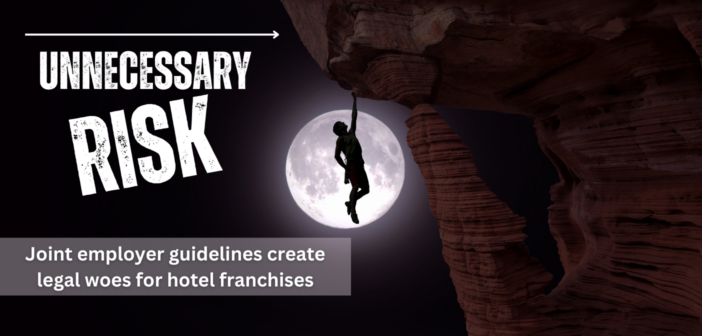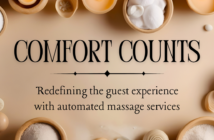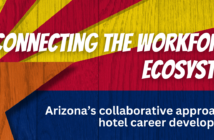Joint employer guidelines create legal woes for hotel franchises
by MATT GOEBEL
The U.S. National Labor Relations Board’s (NLRB) decision to narrow the scope of the joint employer definition before 2020 led to a staggering 93% increase in lawsuits The resulting litigation and efforts to comply with the broad definition cost the franchise community more than $33 billion in revenue and 376,000 jobs. Unfortunately, the current NLRB is signaling a return to the more general and unclear definition of joint employer, which could lead to a new wave of legal liability, lost jobs, and lower revenues.
To navigate this challenging legal landscape, franchisors and franchisees must strengthen their relationship and minimize risk. Clear visibility and effective management can help achieve this goal, benefiting both parties.
THE HOTEL INDUSTRY’S INCREASINGLY LITIGIOUS WORLD
AAHOA recently hosted FTC Chairwoman Lina Khan on a public video call to discuss reforms to franchising, due to the FTCs partnership with the NLRB on the subject. But, the hotel industry continues to face legal disputes – exacerbated by the pandemic – due to the constantly changing laws and regulations.
- In 2023, Days Inn agreed to pay $24 million to settle a lawsuit filed by eight human trafficking victims who stayed at its Roosevelt Boulevard property in Philadelphia. The lawsuit claimed that the owner and management of the property failed to provide adequate protection to the victims.
- Also in 2023, a Nashville man filed a lawsuit against the Hilton Nashville Downtown Hotel, alleging that the hotel hired a person convicted of voluntary manslaughter. The plaintiff contends that the hotel employee entered his room without permission and sexually assaulted him.
Ensuring compliance with HR regulations is crucial for franchisors (Zors), particularly service-based brands. The FTC guidelines now hold franchisors responsible for any illegal practices within their franchises, including those in the hotel industry. These guidelines include enforcing legal obligations related to advertising, marketing, and labor practices. Zors need to establish compliance programs to minimize the risk of legal action and penalties.
TECHNOLOGY AND PROCESSES FOR ZEES AND ZORS
One solution for protecting hotels against litigation is automated employee checks. These checks automate all required inspections for franchisees (Zees), minimizing the risk of human error and ensuring compliance with legal obligations. By automating the process, hotels can provide the timely completion of all required checks and avoid costly mistakes, such as hiring an employee with a criminal record or an expired license.
Automated employee checks can also help hotels comply with changing legal requirements, such as ban the box legislation, which prohibits employers from asking about an applicant’s criminal history on job applications. By providing a standardized, automatic process for conducting background and other required inspections, franchise operators can ensure compliance with legal requirements and minimize the risk of litigation.
Zors in industries especially vulnerable to litigation, such as hotels, restaurants, spas, and daycares, can benefit significantly from automated employee checks. Without automation, human managers must remember to conduct timely checks. Omitting this step creates significant risk for the franchise, its employees, and the brand’s reputation. Automated employee checks eliminate the less-reliable human element ensuring prompt, on-time employee inspections, protecting businesses of any size.
PROACTIVE COMPLIANCE
Zees need more than just technology for compliance. Zors need to follow legal rules for employee background checks. The Fair Credit Reporting Act (FCRA) mandates specific procedures for conducting background checks on job applicants, including obtaining written consent and providing clear disclosures. Noncompliance with the FCRA can lead to legal trouble for Zors and Zees.
Hotel franchise agreements give franchisors significant control over a hotel’s physical and operational aspects, giving franchisors the power they need to ensure Zees meet brand and legal standards. Proper support from Zors can drastically minimize legal risks. Zors must proactively establish compliance programs and provide thorough training to franchisees on legal obligations. Successful implementation requires ongoing communication, training, and aid from the franchisor. Taking a proactive approach to compliance will build a prosperous franchise system that benefits everyone.
This article is not intended to provide legal advice, and Matt Goebel is not a licensed attorney. Readers are encouraged to consult with a qualified legal professional for personalized advice and guidance.
 Matt Goebel is the founder and CEO of Woven, an IFA Supplier Forum member, a multi-unit franchisee and a software consultancy owner responsible for building custom software solutions for franchise groups for more than a decade. Woven is a SaaS platform custom-built for franchise operations and the day-to-day management of employees, locations and operations.
Matt Goebel is the founder and CEO of Woven, an IFA Supplier Forum member, a multi-unit franchisee and a software consultancy owner responsible for building custom software solutions for franchise groups for more than a decade. Woven is a SaaS platform custom-built for franchise operations and the day-to-day management of employees, locations and operations.




